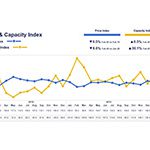
What is striking is that, at the same time, on many transport routes from European countries to Italy the available transport capacity was significantly lower than in February 2019. This are results of current evaluations of the Transport Market Monitor (TMM). The online service is provided by Tim Consult on the basis of the transport data of up to monthly 150,000 real spot market transports, which are processed via the leading European Transporeon platform.
An overview of key developments in February 2020:
- The capacity index increased by 30.1 percent to 159.4 index points compared to January (index 122.5). This is the highest value since 2008.
- The transport price index fell to 94.8 index points, which corresponds to a price drop of 8.6 percent compared to the previous month (index 103.7).
- The diesel price index fell by 3.1 percent compared to January and was slightly above the value of February 2019 (+1.1%).
- The strong increase in available transport capacity also continued in the chemical and life science industries (+25.6%), the building materials sector (+29.5%) as well as in the automotive industry (+21.3%).
“We have been observing increasing capacities and falling prices for months. In the indicator industries, however, in February the decline in transport prices was particularly significant. In the chemical and life science industries, for example, prices fell by 14.2 percent”, says Oliver Kahrs, Managing Director of Tim Consult, a subsidiary of Transporeon.
Monthly development of the price and capacity index (March 2018 to February 2020)
Although more transport capacity was available on the spot market throughout Europe last month compared to February 2019, significantly less freight space was offered at short-term on transport routes from many European countries to Italy.
“This could be related to the spread of the coronavirus in Italy from mid-February. There are many indications that in the current situation fewer transport service providers are prepared to operate on the Italian market”, says Kahrs.
With regard to transports within Italy the situation was different. In the national business, the available capacities were 12.5 percent higher this year than in the same month last year. Nevertheless, prices also rose by 15.3 percent.
“Forwarders within Italy offer the available freight space comprehensively but seem to charge extra for their services. Shippers, in turn, accept more expensive prices, despite receiving more offers than in February 2019″, explains Kahrs.
Kahrs expects the coronavirus to have an impact on Europe as a whole: While in the past the supply of free freight space for seasonal reasons always reduced from March onwards, the development could be different this year. According to The Federation of German Industries (BDI) the consequences of the coronavirus are clearly visible in the global economy as well as in the export-oriented German industry. “Contrary to known patterns, an economic slowdown would lead to a further increase in capacity in the upcoming months”, Kahrs explains. “Therefore, the evaluations of the Transport Market Monitor will reflect the actual economic development at a particularly early stage”, Kahrs adds.
